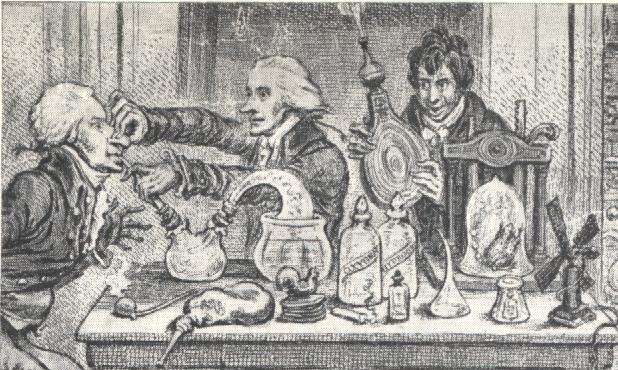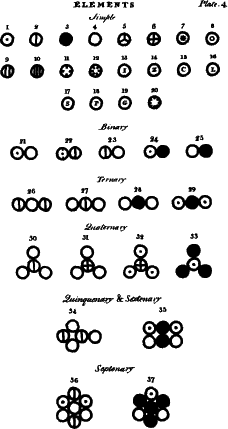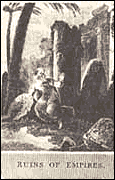Yet though lovely and full of noble feeling, my poor Perdita (for this was
the fanciful name my sister had received from her dying parent), was not
altogether saintly in her disposition. Her manners were cold and repulsive.
If she had been nurtured by those who had regarded her with affection, she
might have been different; but unloved and neglected, she repaid want of
kindness with distrust and silence. She was submissive to those who held
authority over her, but a perpetual cloud dwelt on her brow; she looked as
if she expected enmity from every one who approached her, and her actions
were instigated by the same feeling. All the time she could command she
spent in solitude. She would ramble to the most unfrequented places, and
scale dangerous heights, that in those unvisited spots she might wrap
herself in loneliness. Often she passed whole hours walking up and down the
paths of the woods; she wove garlands of flowers and ivy, or watched the
flickering of the shadows and glancing of the leaves; sometimes she sat
beside a stream, and as her thoughts paused, threw flowers or pebbles into
the waters, watching how those swam and these sank; or she would set afloat
boats formed of bark of trees or leaves, with a feather for a sail, and
intensely watch the navigation of her craft among the rapids and shallows
of the brook. Meanwhile her active fancy wove a thousand combinations; she
dreamt "of moving accidents by flood and field"--she lost herself
delightedly in these self-created wanderings, and returned with unwilling
spirit to the dull detail of common life.
Poverty was the cloud that veiled her excellencies, and all that was good
in her seemed about to perish from want of the genial dew of affection. She
had not even the same advantage as I in the recollection of her parents;
she clung to me, her brother, as her only friend, but her alliance with me
completed the distaste that her protectors felt for her; and every error
was magnified by them into crimes. If she had been bred in that sphere of
life to which by inheritance the delicate framework of her mind and person
was adapted, she would have been the object almost of adoration, for her
virtues were as eminent as her defects. All the genius that ennobled the
blood of her father illustrated hers; a generous tide flowed in her veins;
artifice, envy, or meanness, were at the antipodes of her nature; her
countenance, when enlightened by amiable feeling, might have belonged to a
queen of nations; her eyes were bright; her look fearless.
Although by our situation and dispositions we were almost equally cut off
from the usual forms of social intercourse, we formed a strong contrast to
each other. I always required the stimulants of companionship and applause.
Perdita was all-sufficient to herself. Notwithstanding my lawless habits,
my disposition was sociable, hers recluse. My life was spent among tangible
realities, hers was a dream. I might be said even to love my enemies, since
by exciting me they in a sort bestowed happiness upon me; Perdita almost
disliked her friends, for they interfered with her visionary moods. All my
feelings, even of exultation and triumph, were changed to bitterness, if
unparticipated; Perdita, even in joy, fled to loneliness, and could go on
from day to day, neither expressing her emotions, nor seeking a
fellow-feeling in another mind. Nay, she could love and dwell with
tenderness on the look and voice of her friend, while her demeanour
expressed the coldest reserve.
A sensation with her became a sentiment, and
she never spoke until she had mingled her perceptions of outward objects
with others which were the native growth of her own mind. She was like a
fruitful soil that imbibed the airs and dews of heaven, and gave them forth
again to light in loveliest forms of fruits and flowers; but then she was
often dark and rugged as that soil, raked up, and new sown with unseen
seed.
VOLUME ONE CHAPTER 2.
I lived far from the busy haunts of men, and the rumour of wars or
political changes came worn to a mere sound, to our mountain abodes.
England had been the scene of momentous struggles, during my early boyhood.
In the year 2073, the last of its kings, the ancient friend of my father,
had abdicated in compliance with the gentle force of the remonstrances of
his subjects, and a republic was instituted. Large estates were secured to
the dethroned monarch and his family; he received the title of Earl of
Windsor, and Windsor Castle, an ancient royalty, with its wide demesnes
were a part of his allotted wealth. He died soon after, leaving two
children, a son and a daughter.
VOLUME THREE CHAPTER 1.
Hear you not the rushing sound of the coming tempest? Do you not behold the
clouds open, and destruction lurid and dire pour down on the blasted earth?
See you not the thunderbolt fall, and are deafened by the shout of heaven
that follows its descent? Feel you not the earth quake and open with
agonizing groans, while the air is pregnant with shrieks and wailings,--all
announcing the last days of man?
No! none of these things accompanied our fall! The balmy air of spring,
breathed from nature's ambrosial home, invested the lovely earth, which
wakened as a young mother about to lead forth in pride her beauteous
offspring to meet their sire who had been long absent. The buds decked the
trees, the flowers adorned the land: the dark branches, swollen with
seasonable juices, expanded into leaves, and the variegated foliage of
spring, bending and singing in the breeze, rejoiced in the genial warmth of
the unclouded empyrean: the brooks flowed murmuring, the sea was waveless,
and the promontories that over-hung it were reflected in the placid waters;
birds awoke in the woods, while abundant food for man and beast sprung up
from the dark ground. Where was pain and evil? Not in the calm air or
weltering ocean; not in the woods or fertile fields, nor among the birds
that made the woods resonant with song, nor the animals that in the midst
of plenty basked in the sunshine. Our enemy, like the Calamity of Homer,
trod our hearts, and no sound was echoed from her steps--
"With ills the land is rife, with ills the sea,
Diseases haunt our frail humanity,
Through noon, through night, on casual wing they glide,
Silent,--a voice the power all-wise denied."
[Elton's translation of Hesiod]
Once man was a favourite of the Creator, as the royal psalmist sang,
"God had made him a little lower than the angels, and had crowned him with
glory and honour. God made him to have dominion over the works of his
hands, and put all things under his feet."
Once it was so; now is man lord of the creation? Look at him--ha! I see
plague! She has invested his form, is incarnate in his flesh, has entwined
herself with his being, and blinds his heaven-seeking eyes. Lie down, O
man, on the flower-strown earth; give up all claim to your inheritance, all
you can ever possess of it is the small cell which the dead require.
Plague is the companion of spring, of sunshine, and plenty. We no longer
struggle with her. We have forgotten what we did when she was not. Of old
navies used to stem the giant ocean-waves betwixt Indus and the Pole for
slight articles of luxury. Men made perilous journies to possess themselves
of earth's splendid trifles, gems and gold. Human labour was wasted--human
life set at nought. Now life is all that we covet; that this automaton of
flesh should, with joints and springs in order, perform its functions, that
this dwelling of the soul should be capable of containing its dweller. Our
minds, late spread abroad through countless spheres and endless
combinations of thought, now retrenched themselves behind this wall of
flesh, eager to preserve its well-being only. We were surely sufficiently
degraded.
At first the increase of sickness in spring brought increase of toil to
such of us, who, as yet spared to life, bestowed our time and thoughts on
our fellow creatures. We nerved ourselves to the task: "in the midst of
despair we performed the tasks of hope." We went out with the resolution of
disputing with our foe. We aided the sick, and comforted the sorrowing;
turning from the multitudinous dead to the rare survivors, with an energy
of desire that bore the resemblance of power, we bade them--live. Plague
sat paramount the while, and laughed us to scorn.
Have any of you, my readers, observed the ruins of an anthill immediately
after its destruction? At first it appears entirely deserted of its former
inhabitants; in a little time you see an ant struggling through the
upturned mould; they reappear by twos and threes, running hither and
thither in search of their lost companions. Such were we upon earth,
wondering aghast at the effects of pestilence. Our empty habitations
remained, but the dwellers were gathered to the shades of the tomb.
As the rules of order and pressure of laws were lost, some began with
hesitation and wonder to transgress the accustomed uses of society. Palaces
were deserted, and the poor man dared at length, unreproved, intrude into
the splendid apartments, whose very furniture and decorations were an
unknown world to him. It was found, that, though at first the stop put to
to all circulation of property, had reduced those before supported by the
factitious wants of society to sudden and hideous poverty, yet when the
boundaries of private possession were thrown down, the products of human
labour at present existing were more, far more, than the thinned generation
could possibly consume. To some among the poor this was matter of
exultation. We were all equal now; magnificent dwellings, luxurious
carpets, and beds of down, were afforded to all. Carriages and horses,
gardens, pictures, statues, and princely libraries, there were enough of
these even to superfluity; and there was nothing to prevent each from
assuming possession of his share. We were all equal now; but near at hand
was an equality still more levelling, a state where beauty and strength,
and wisdom, would be as vain as riches and birth. The grave yawned beneath
us all, and its prospect prevented any of us from enjoying the ease and
plenty which in so awful a manner was presented to us.
© Andrew Roberts 25.10.1990 -
Citation suggestion
Referencing
My referencing suggestion for this page is a bibliography entry:
"Roberts, Andrew 25.10.1990 - Pandora's box - The gift of
science - Frankenstein, science and industry
<http://www.mdx.ac.uk/www/study/SHE6.htm>
Middlesex University"
With intext references to "(Roberts, A. 25.10.1990)"
See ABC
Referencing for general advice.
 Study
Link
Study
Link
 Andrew Roberts' web Study Guide
Andrew Roberts' web Study Guide
 Top of
Page
Top of
Page
 Take a Break - Read a Poem
Take a Break - Read a Poem
Andrew Roberts likes to hear from users:
To contact him, please
use the Communication
Form








